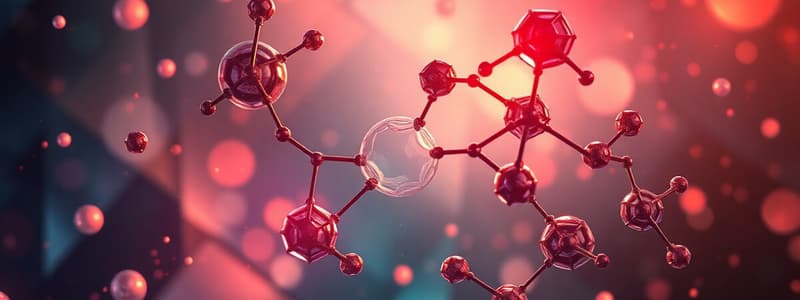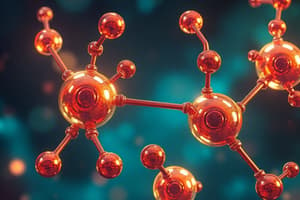Podcast
Questions and Answers
What is organic chemistry primarily concerned with?
What is organic chemistry primarily concerned with?
The study of hydrocarbons and their derivatives.
What are the four types of formulae of organic compounds?
What are the four types of formulae of organic compounds?
- Molecular formula (correct)
- Electronic or Dot and Cross formula (correct)
- Structural formula (correct)
- Condensed formula (correct)
Who synthesized the first organic compound urea from an inorganic substance?
Who synthesized the first organic compound urea from an inorganic substance?
Wohler
Organic compounds exclude carbon dioxide and carbonates.
Organic compounds exclude carbon dioxide and carbonates.
What elements are primarily found in organic compounds?
What elements are primarily found in organic compounds?
Match the following organic compound types with their definitions:
Match the following organic compound types with their definitions:
What did the Vital Force Theory propose?
What did the Vital Force Theory propose?
Which of the following is NOT considered an organic compound?
Which of the following is NOT considered an organic compound?
Flashcards are hidden until you start studying
Study Notes
Organic Chemistry: A Branch of Chemistry
- Organic chemistry focuses on compounds containing carbon and hydrogen, forming hydrocarbons and their derivatives, where carbon is the essential element.
- The study of organic compounds includes understanding their structural, condensed, and molecular formulas to represent their composition and arrangement.
- Historically, the term "organic" referred to substances found in living organisms due to the "vital force" theory, which suggested they couldn't be synthesized artificially.
- However, the theory was disproven when scientists like Wohler synthesized urea from inorganic materials, and Kolbe produced acetic acid in a laboratory.
- Today, the definition has changed to focus on carbon-based compounds, encompassing a vast range of substances like carbohydrates, proteins, lipids, and polymers.
- Some examples include pharmaceuticals, pesticides, plastics, and synthetic fibers, highlighting the diverse applications of organic chemistry.
Key Facts About Organic Compounds
- Molecular Formula: Represents the actual number of atoms in a molecule, like C4H10 for butane.
- Structural Formula: Shows the precise arrangement of atoms in a molecule, indicating single, double, and triple bonds.
- Condensed Formula: Highlights the groups of atoms attached to each carbon atom in a chain.
- Electronic or Dot and Cross Formula: Depicts the sharing of electrons between atoms in the molecular structure.
Breaking the Vital Force Theory
- Wohler's synthesis of urea in 1828 proved that organic compounds could be made from inorganic substances, defying the theory that only living organisms could produce them.
- Kolbe's subsequent synthesis of acetic acid in 1845 further solidified this disproof.
- This led to a shift in understanding the origins of organic compounds and paved the way for modern organic chemistry, which focuses on the properties and reactions of carbon-containing compounds.
Studying That Suits You
Use AI to generate personalized quizzes and flashcards to suit your learning preferences.




